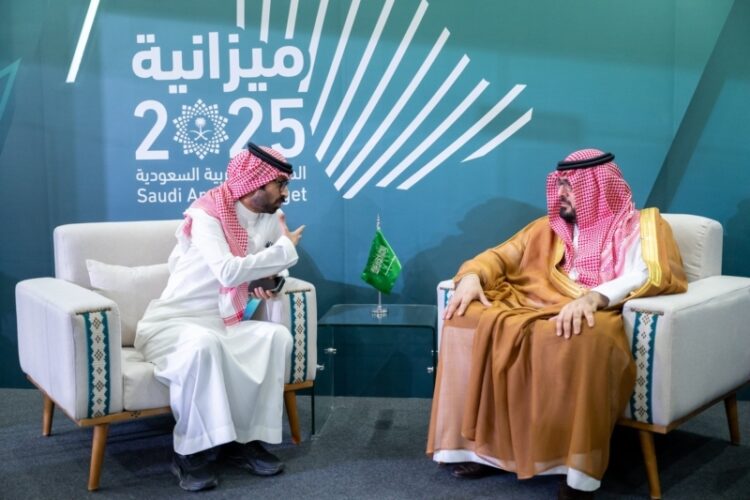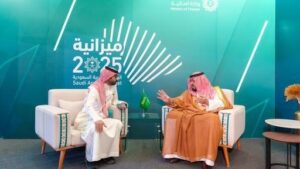Publisher: Maaal International Media Company
License: 465734
Saudi Minister of Economy to “Maaal”: National Infrastructure Fund will launch a program to support the private sector in education and healthcare, aiming to increase private school enrollment by 25% and private sector participation in healthcare services to 32%
اقرأ المزيد
In an interview with “Maaal” newspaper, Faisal Al-Ibrahim, the Minister of Economy and Planning, spoke on the sidelines of the 2025 Budget Forum about the key economic transformations witnessed by the Kingdom thanks to Vision 2030. He emphasized that structural and economic reforms have contributed to exceptional growth in non-oil activities, noting the success of the vision in addressing global economic challenges and boosting the national economy. He also discussed the role of the National Infrastructure Fund in supporting infrastructure projects in collaboration with the National Center for Privatization, as well as the development of innovative financing solutions to enable the private sector to strengthen healthcare and education sectors. The Minister also stressed the importance of attracting foreign investments and providing incentives to make the Kingdom an attractive destination for investment.
Al-Ibrahim also stressed on the Ministry of Economy and Planning’s efforts to protect emerging industries in light of free trade agreements, with a focus on supporting the growth of medium and small-sized cities to achieve balanced development and ensure broader distribution of economic opportunities. The following are excerpts from the interview.
The Robustness of the Kingdom’s Economy
Q: Eight years after the launch of Vision 2030, how would you assess the role the vision has played in developing the Saudi economy thus far, and what have been its impacts on GDP growth? How has it contributed to strengthening the national economy in general?
A: The comprehensive structural and economic reforms initiated with the launch of Saudi Vision 2030 have contributed to exceptional growth and remarkable figures at the domestic level. To summarize my response, I’ll mention an example that illustrates the strength of the Kingdom’s economy and how these efforts and reforms have enhanced its resilience. In the past few years, the world has experienced significant uncertainty, with major geopolitical tensions, rising inflation levels, disruptions in supply chains, a substantial increase in the structural debt of many countries, and tight monetary policies, among other external factors. Despite these challenges, the Kingdom’s economy has continued to achieve exceptional growth rates. Over the past three years, non-oil activities, at constant prices, have grown by an average of 5.8%. This growth was driven by the recovery and flourishing of promising sectors such as tourism and entertainment, transportation and logistics, and the industrial sector. It’s worth noting that non-oil activities reached their highest level in 2023, totaling 1.7 trillion riyals. This is, in itself, a reflection of the efforts of Vision 2030, which focuses on diversifying the economic base and ensuring financial sustainability.
Achieving Vision 2030 Goals
Q: As the Chairman of the National Infrastructure Fund, how will the fund collaborate with the National Center for Privatization to finance infrastructure projects? What are the key areas the fund can support in achieving the goals of Vision 2030?
National Infrastructure Fund Collaborates with the National Center for Privatization to Support Education and Healthcare Expansion
The National Infrastructure Fund works closely with the National Center for Privatization as a key partner in enabling the allocation of government assets and services. Both entities aim to increase private sector participation in infrastructure projects, in line with the goals of the Privatization Program under Saudi Vision 2030.
In this collaboration, the fund and the center developed regulatory frameworks and governance structures last year to increase the attractiveness of privatization projects for private sector investors. These joint efforts contribute to achieving sustainable economic and social development, further advancing the realization of Vision 2030’s objectives.
Empowering the Private Sector
Q: Will funding from the National Infrastructure Fund be directed towards expanding projects in education and healthcare, particularly the construction of schools and hospitals? How does the fund aim to meet the growing demand in these sectors in light of national transformation?
A: The Fund focuses on supporting strategic and vital sectors, including education and healthcare, due to their importance in promoting national development. In this regard, the fund is developing a specialized program to support projects in schools, universities, and healthcare facilities, which is expected to be launched in 2025. The details will be announced at that time.
The program aims to empower the private sector to strengthen these vital sectors in alignment with Saudi Vision 2030. It seeks to increase private school enrollment to 25% and raise private sector participation in healthcare services to 32%. The program will also improve the quality of services provided and diversify targeted sub-sectors, such as special education and long-term care, as well as other critical sectors.
Developing Innovative Financing Solutions
Q: What are your estimates for the financing needs in infrastructure sectors, particularly in healthcare and education, and what role will the fund play in meeting those financial needs?
A: The Ministry of Economy and Planning is currently working with relevant entities to assess the demand and determine the expected investments in infrastructure across many sectors, including healthcare and education. I would like to emphasize that the private sector will play a central role in these investments in line with the targets of Vision 2030. The National Infrastructure Fund will have a key role in developing innovative financing products in collaboration with government entities and relevant private sector stakeholders to stimulate investments in these vital sectors.
Attracting Foreign Investment to Saudi Arabia
Q: How can the National Infrastructure Fund attract foreign investments to Saudi Arabia? Will guarantees or incentives be offered to attract foreign investors to participate in infrastructure projects?
A: The Fund continuously contributes to attracting foreign investments to Saudi Arabia by encouraging the participation of both local and foreign private sectors in infrastructure projects. It provides integrated, innovative financing solutions that cater to the needs of both local and foreign investors. Despite its recent establishment, the fund has already contributed to financing several deals with commitments totaling 8.3 billion riyals, achieving a private sector participation multiplier of more than five times.
Furthermore, the regional perspective in many strategies has identified gaps between regions, directing several infrastructure projects to the most underserved areas. This promotes balanced development across regions and ensures the provision of essential services to more than 10,000 population centers in the Kingdom, positioning Saudi Arabia among the most advanced nations globally.
Opening New Horizons for Exports
Q: In light of free trade agreements, what strategies is the Ministry of Economy and Planning adopting to protect emerging industries in Saudi Arabia from global competition?
A: Through these agreements, the Ministry seeks to open new avenues for exports by removing both tariff and non-tariff barriers and creating a business environment conducive to attracting foreign investment and developing local value chains. The ministry also aims to provide necessary support to emerging projects by negotiating terms that facilitate the transfer of modern technologies, enable knowledge transfer, and develop human capital in alignment with Vision 2030.
The ministry collaborates with other relevant entities in the Kingdom to enhance negotiations for free trade agreements for the GCC with international trade partners. These efforts focus on crafting balanced agreements that achieve several strategic goals, including supporting the growth of emerging industries by enabling them to expand within the local market and strengthening their competitiveness in regional and global markets.
The efforts also include establishing clear frameworks to protect local industries, supporting them against challenges posed by international competition, and ensuring the long-term sustainability of these industries, which strengthens the position of Saudi industry in global markets.
Economic Diversification
Q: Some countries offer incentives to encourage exports, such as discounts on bills and shipping costs. Does Saudi Arabia have any similar plans to enhance the competitiveness of Saudi products in foreign markets?
A: Absolutely, there are many incentives and enablers to encourage exports and increase the private sector’s contribution to economic diversification, thereby enhancing the competitiveness of exports. Among these efforts:
- Exemptions and enablers for the industrial sector, such as the launch of the industrial sector competitiveness program and extending the exemption for small businesses from financial fees.
- Exemptions for industrial establishments from customs duties on machinery, equipment, and other production inputs.
- Creation and development of special economic zones and economic cities, offering competitive advantages for companies, including favorable tax rates, exemptions on imports, production inputs, machinery, and raw materials, among other incentives.
Leveraging the Comparative Advantages of Cities
Q: Strengthening and developing Riyadh as the capital is a vital step to support the Saudi economy and enhance its position as a central city. However, supporting the development of medium and small cities remains essential for achieving balanced overall development. What strategies could be adopted to support and strengthen the growth of medium and small cities, ensuring the wider distribution of economic opportunities and services?
A: The key strategies to support and develop medium and small cities include focusing on several key areas, such as leveraging the comparative advantages of cities, strengthening manufacturing industries, developing infrastructure and essential services, establishing specialized economic clusters, stimulating local and foreign investments, offering incentives and enablers, supporting specialized training and qualification centers to meet the needs of local economic sectors, and adopting a developmental distribution approach to ensure balanced allocation of resources and projects across regions.
By adopting these strategies, we can ensure a more efficient distribution of economic opportunities and services, enhance the stability and prosperity of medium and small cities, and direct our investments toward a sustainable future. This will contribute to diversifying our economy and enhancing Saudi Arabia’s position regionally and globally.









